The USS Yorktown is the second of twenty-four Essex-class aircraft carriers launched during World War II. The Yorktown served in World War II and Vietnam and was the recovery ship for Apollo 8, the first manned spacecraft to orbit the moon. Today the Yorktown is a National Historic Landmark and open for tours as part of the Patriots Point Naval and Maritime Museum. In 2012, the second annual Carrier Classic college basketball game was held on the Yorktown‘s flight deck.
Trip highlights from Jan 4th, 2017 at Patriots Point Naval and Maritime Museum in Charleston follow. Click any image for a larger view, or click the position to view the location on a map. And a live map of our current route and most recent log entries always is available at http://mvdirona.com/maps
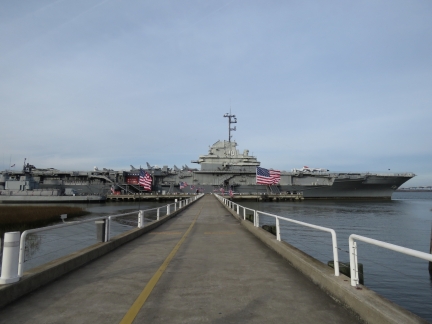 |
USS Yorktown
Position: -79 54.42, 32 47.42
We arrived at the Patriots Point Naval and Maritime Museum a few minutes before they opened at 9am and didn’t leave until nearly closing time at 6pm. There’s a lot to see and do. We started on the USS Yorktown. This was our first time on an aircraft carrier and we spent a good half of the day there.
|
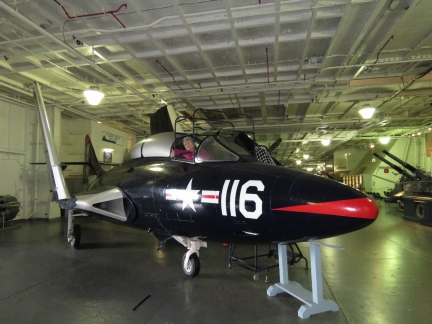 |
TF-9J Cougar
Position: -79 54.50, 32 47.40
Jennifer at the helm of a TF-9J Cougar carrier-based fighter and trainer on the USS Yorktown hanger bay #2.
|
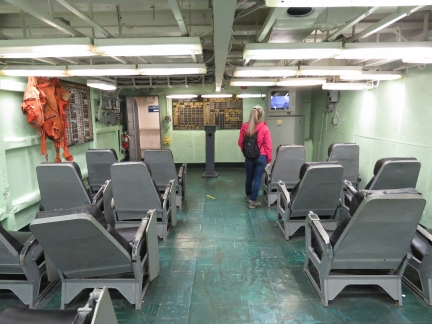 |
Pilot Briefing Room
Position: -79 54.51, 32 47.42
.
|
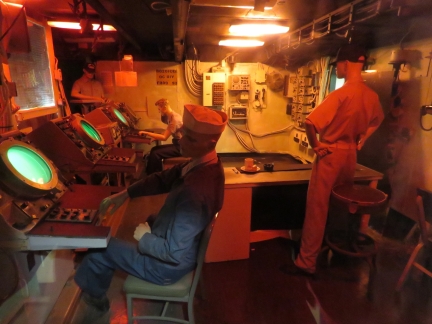 |
CATCC
Position: -79 54.51, 32 47.42
Carrier Air Traffic Control Center (CATCC) is responsible for aircraft control and recovery.
|
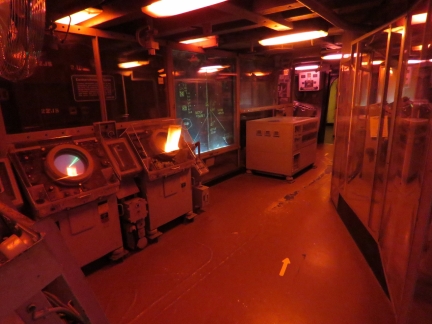 |
Yorktown CIC
Position: -79 54.51, 32 47.42
The Combat Information Center (CIC) tracks and identifies all contacts reported by lookouts, radar and sonar.
|
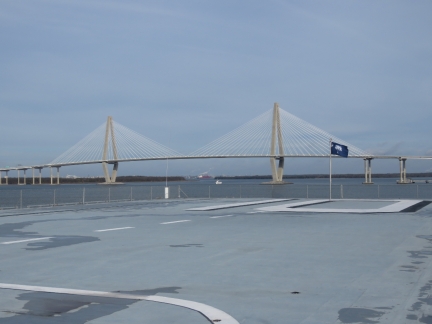 |
Bridge
Position: -79 54.51, 32 47.46
The view to Arthur Ravenel Jr. Bridge from the flight deck.
|
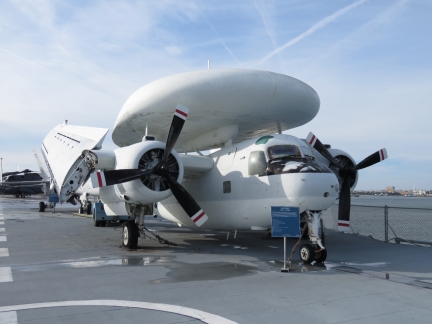 |
E-1B Tracer
Position: -79 54.51, 32 47.47
This E-1B Tracer is one of at least a dozen planes on the Yorktown‘s flight deck.
|
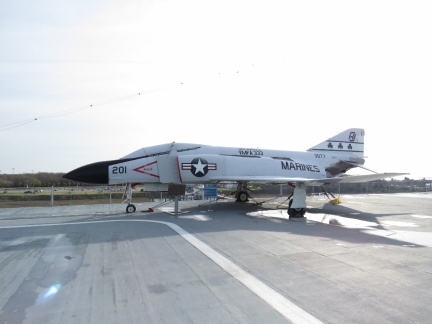 |
F-4J Phantom II
Position: -79 54.51, 32 47.47
.
|
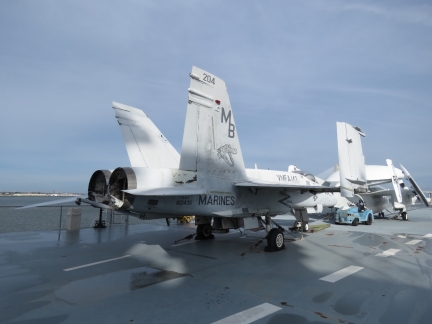 |
F/A-18A Hornet
Position: -79 54.51, 32 47.44
.
|
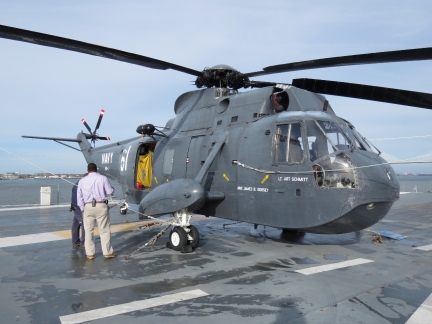 |
SH-3G Sea King
Position: -79 54.52, 32 47.42
.
|
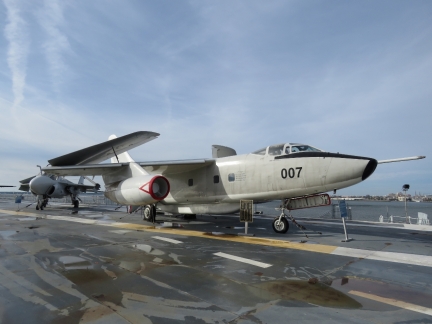 |
EA-3B Skywarrior
Position: -79 54.51, 32 47.42
.
|
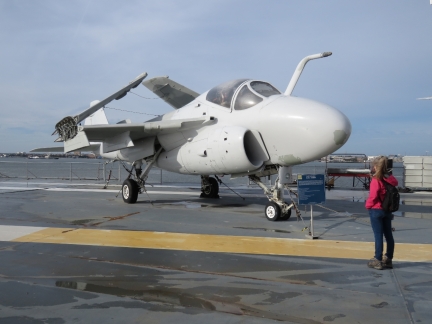 |
A-6E Intruder
Position: -79 54.51, 32 47.39
.
|
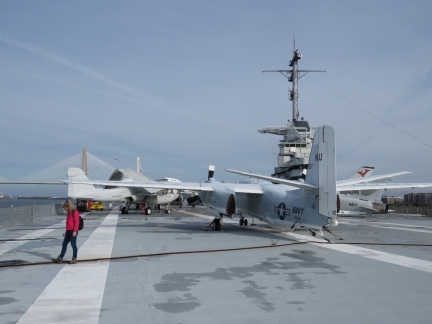 |
S-2 Tracker
Position: -79 54.51, 32 47.37
Jennifer standing on one of the Yorktown‘s five arresting cables near an S-2 Tracker.
|
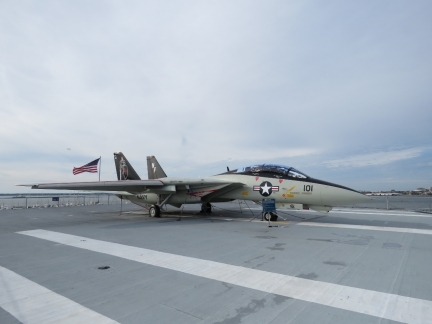 |
F-14A Tomcat
Position: -79 54.50, 32 47.38
James’ favorite fighter, an F14A Tomcat
|
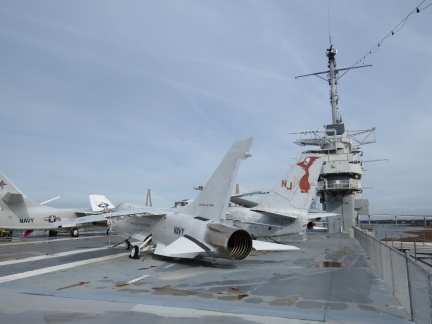 |
F-8K Crusader
Position: -79 54.50, 32 47.40
.
|
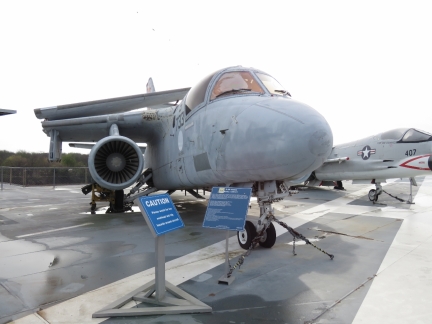 |
S-3B Viking
Position: -79 54.51, 32 47.41
.
|
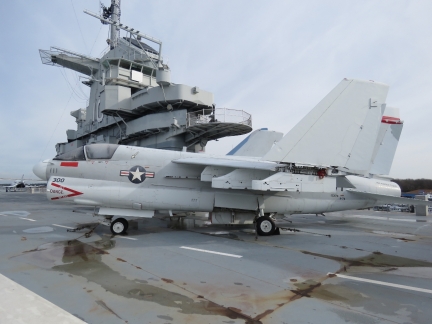 |
A-7E Corsair
Position: -79 54.51, 32 47.41
.
|
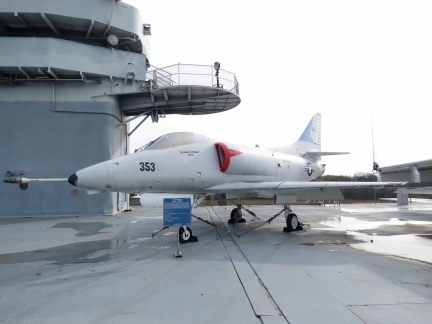 |
A-4C Skyhawk
Position: -79 54.51, 32 47.42
.
|
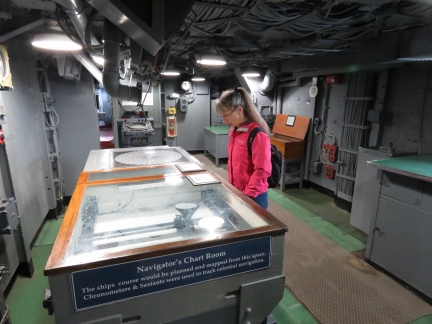 |
Chart Room
Position: -79 54.50, 32 47.43
.
|
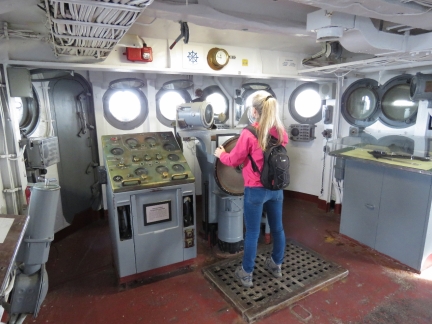 |
Pilot House
Position: -79 54.50, 32 47.43
In the pilot house at the helm of the Yorktown.
|
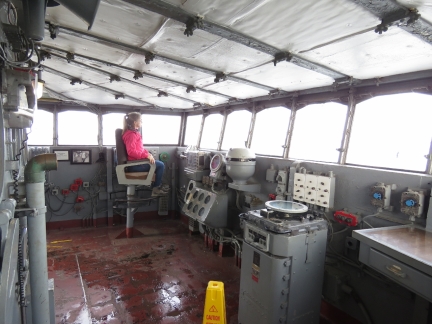 |
Captains Bridge
Position: -79 54.50, 32 47.43
.
|
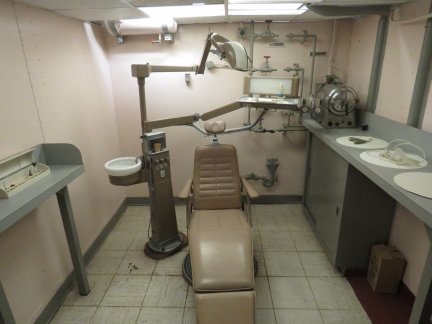 |
Dentist
Position: -79 54.51, 32 47.42
With over 3,000 men on board, the Yorktown is a small city and has full dental and medical facilities.
|
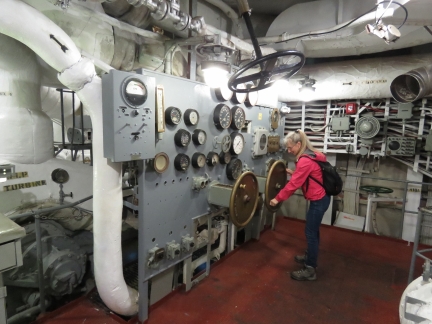 |
Engine Room
Position: -79 54.50, 32 47.43
Bringing up steam in the engine room. The Yorktown has 9 steam boilers and 4 turbines that power 4 propellers. With 120,000 shaft hp, the ship can reach speeds of 32.5 kts.
|
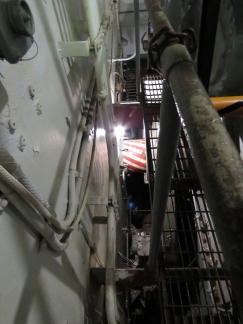 |
Prop Shaft
Position: -79 54.50, 32 47.43
The propeller shaft is painted in a candy strip pattern to make it obvious when it is spinning for safety reasons.
|
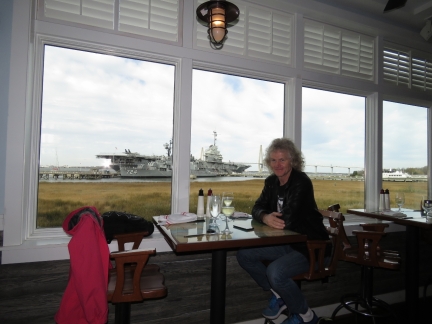 |
Fish House
Position: -79 54.39, 32 47.25
We had an excellent lunch at the nearby Fish House in the Charleston Harbor Resort and Marina with a view to the ships at Patriots Point and the Arthur Ravenel Jr. Bridge beyond.
|
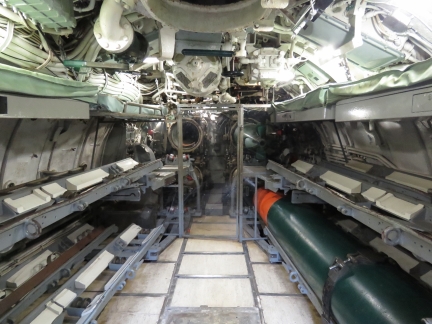 |
USS Clamagore
Position: -79 54.52, 32 47.31
On the way back from lunch we toured the USS Clamagore, a 322-ft diesel-powered submarine commissioned in 1945. The submarine can carry 24 torpedoes and has 10 launch tubes, 5 forward and 4 aft.
|
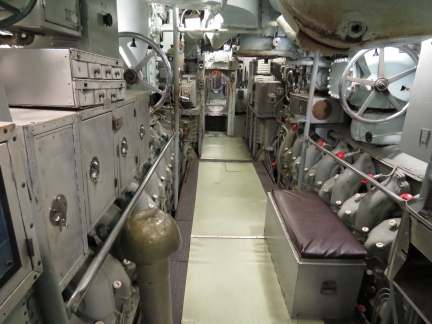 |
Fwd Engine Room
Position: -79 54.52, 32 47.31
The forward engine room on the USS Clamagore. The sub has 4 General Motors V16 diesel engines driving electrical generators and could reach speeds of 20.25 kts at the surface and 8.75 kts underwater.
|
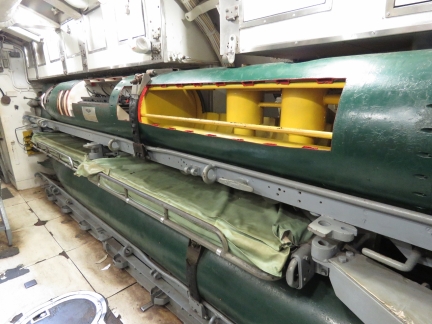 |
Aft Torpedo Room
Position: -79 54.52, 32 47.31
Note the berths tucked in around the torpedo holders. Space is tight on these diesel submarines.
|
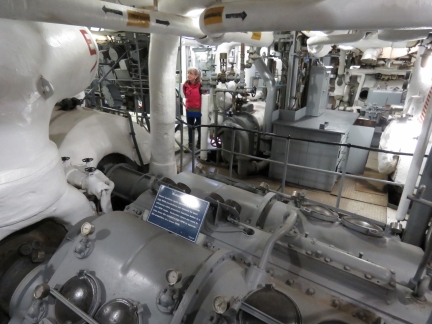 |
USS Laffey
Position: -79 54.50, 32 47.39
In the engine room of the destroyer USS Laffey, was commissioned in 1944. The ship is nicknamed “The Ship that Would Not Die” after surviving an air strike of 22 Japanese bombers and the most relentless suicide kamikaze air attacks in history. Five kamikazes and three bombs struck the ship, killing 32 and wounding 71 of the 336-man crew. The crew managed to shoot down 9 attackers and keep the ship afloat until it could be towed to port.
|
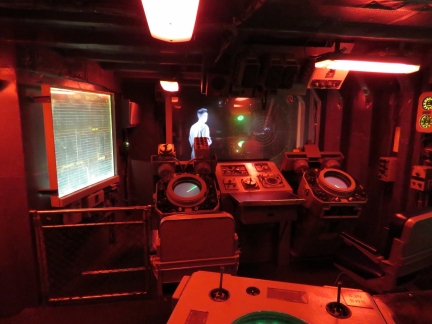 |
Laffey CIC
Position: -79 54.48, 32 47.36
The Laffey tracked Russian submarines during the Cold War. A new exhibit in the Combat Information Center (CIC) uses holographic images to re-enact a tense submarine encounter.
|
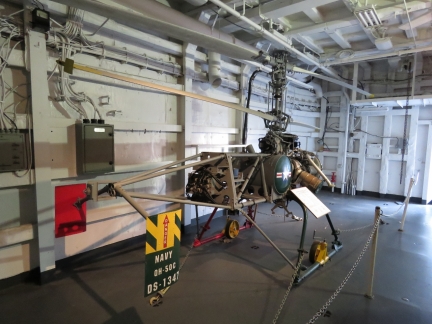 |
QH-50
Position: -79 54.32, 32 47.48
A 1960’s era QH-50 drone helicopter on board the Laffey. We didn’t realize drones even existed back then.
|
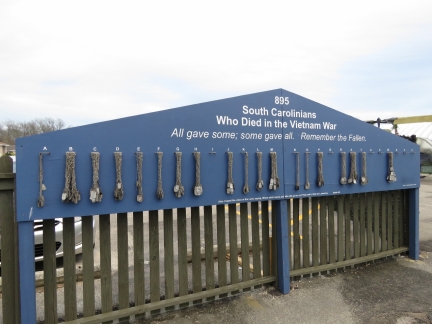 |
Dog Tags
Position: -79 54.34, 32 47.42
Dog tags outside the Vietnam Experience represent all the South Carolinians who died during the Vietnam War.
|
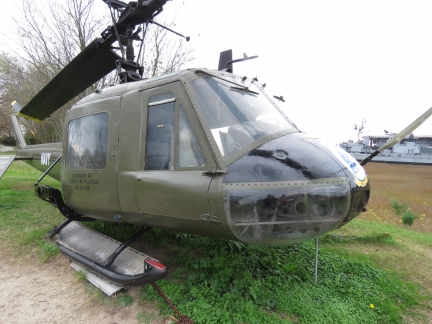 |
UH-1M Iroquois
Position: -79 54.35, 32 47.39
The Vietnam Experience was surprisingly good and explained the history and evolution of the war with sound effects and authentic exhibits. This is a UH-1M helicopter, nicknamed “Huey” after the HU-1 designation.
|
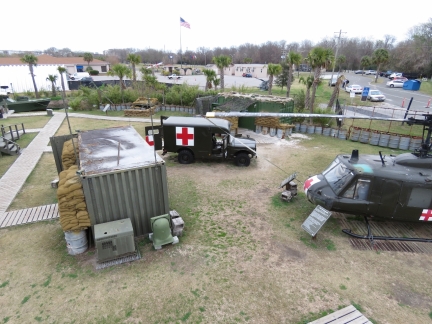 |
Observation Tower
Position: -79 54.34, 32 47.36
Looking down into part of the Vietnam Experience from an observation tower.
|
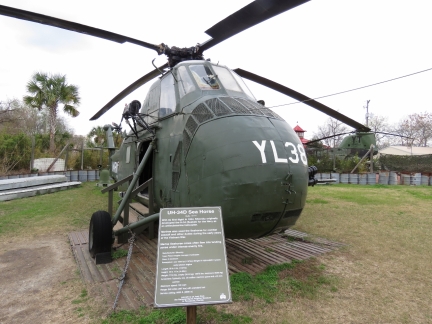 |
UH-34D Sea Horse
Position: -79 54.32, 32 47.36
The Sikorsky UH-34D Sea Horse first flew in 1954 and was used for combat duties and assault during the early years of the Vietnam War.
|
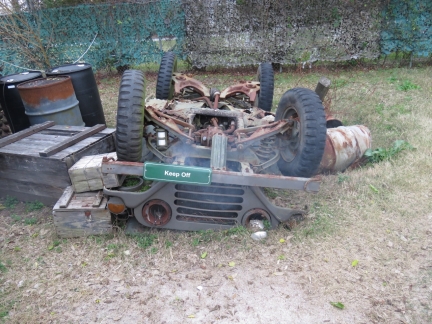 |
Truck
Position: -79 54.34, 32 47.34
This overturned jeep exhibit was complete with steam rising from the radiator.
|
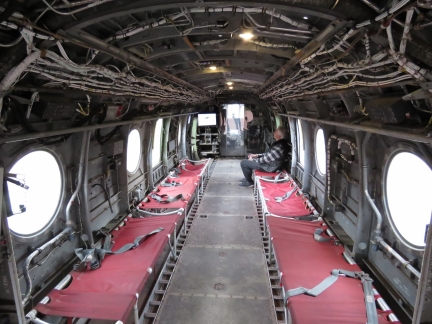 |
CH-46 Sea Knight
Position: -79 54.33, 32 47.34
Looking into the bay of a CH-46 Sea Knight cargo helicopter often used for medical evacuations.
|
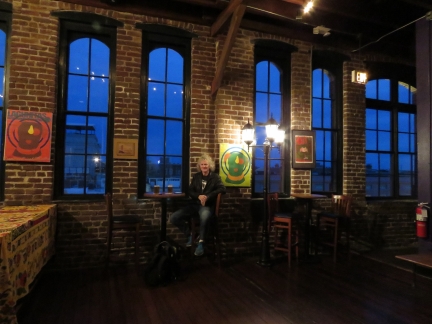 |
Dinner
Position: -79 55.62, 32 46.71
We had a great pizza meal at the Lagunitas brewery in downtown Charleston. The brewery is built in a three-floor 1800s-era building with a huge atrium in the center. Here we are in their third-floor lounge overlooking the city before heading downstairs for dinner.
|

|
Click the travel log icon on the left to see these locations on a map, with the complete log of our cruise.
On the map page, clicking on a camera or text icon will display a picture and/or log entry for that location, and clicking on the smaller icons along the route will display latitude, longitude and other navigation data for that location. And a live map of our current route and most recent log entries always is available at http://mvdirona.com/maps. |

If your comment doesn't show up right away, send us email and we'll dredge it out of the spam filter.